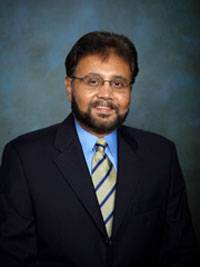Norman Borlaug Centennial Q&A's with Experts:
If Norman Borlaug posed the following questions to you... what would you tell him?

"I believe that innovation will write the next chapter in food security."
Amit Roy, Ph.D., President and CEO
International Fertilizer Development Center, India
Q: What’s the one thing – the single most important – that we need to address to solve food insecurity?
A: Collaboration. One intervention area won’t be enough to end hunger. Achieving sustainable food security depends on holistic solutions implemented through global partnerships. For example, improved fertilizers will not help smallholder farmers if they cannot afford or access them. If farmers have a bumper harvest, their incomes won’t increase unless they can get their products to a profitable market.In order to truly end hunger, we must work together. By learning from one another, we can create solutions that are complementary. Going forward, it is vital to have partnership: between the farmer, the research institution, the policymaker and others.
Q: Do you think we can feed 9 billion people by the year 2050? If so, why? If not, why not?
A: Yes, I think we can. I believe that innovation will write the next chapter in food security. Specifically, future innovations in farming will need to be accessible to farmers and geared toward increasing yields and incomes while simultaneously reducing agriculture’s contribution to climate change. Innovation alone, however, is not the solution. We need to get it to those who would benefit from it.
Q: Where are the biggest gaps right now in the food system?
A: The world lacks innovative agricultural products that are accessible to smallholder farmers. In fact, 70 percent of the fertilizers we use today were developed at the Tennessee Valley Authority about 40 years ago!! The other gaps include effective transfer of new knowledge to farmers (extension) and rural infrastructure, and access to markets particularly in Sub-Saharan Africa.
Q: Within your area of expertise, what is one misunderstood or neglected topic you could shed some light on for readers?
A: In order to help farmers grow more food, public understanding and sentiment regarding fertilizer must improve. Fertilizer has contributed and will continue to the significant increase in global food production. In his Nobel Peace Prize acceptance speech in 1970, Dr. Norman Borlaug stated “If the high-yielding dwarf wheat and rice varieties are the catalysts that have ignited the Green Revolution, then chemical fertilizer is the fuel that has powered its forward thrust.”
However, fertilizer should be judiciously managed to reduce gaseous emissions and nutrient losses from runoff that pollutes waterways. For example, IFDC is currently researching how urea deep placement (a more efficient rice fertilization method than broadcast application) can reduce emissions of nitrous oxide, a greenhouse gas, and reduce water pollution due to nutrient run-off.
Q: What is one thing the general population could do to make an impact on global food security?
A: We produce enough food for the world population but 30 percent to 40 percent is wasted due to the lack of transport facilities, storage and processing facilities. This is compounded by the fact that we also waste food. STOP WASTING!
Q: What is one of your favorite quotes or words to live by?
A: In 2008, Dr. Norman Borlaug wrote me a letter about the future of food security. In it he said, “The work of the Green Revolution is not yet finished and I believe it will take a new round of technological advancement, political commitment, commercial development and a lot of hard work to complete the job.” These words have stuck with me and were the impetus behind IFDC’s formation of the Virtual Fertilizer Research Center. As a valued member of the IFDC board of directors from 1994 to 2003, Dr. Borlaug helped guide IFDC into the field, promoting efforts across the agricultural value chain.
Q: Share with us one your most unique life experiences and what it taught you.
A: The most important that I learned is that you do not rush in with a solution without first understanding the problem. One example that I remember. In a village in Benin, attending the launch of an IFDC project, a villager commented that, “I hope you can give us the tools to solve our problems.” I said “of course.”
I was puzzled by this comment but then understood the reasoning for the question when when I told this story: The week prior, a high-level delegation of government officials and a bilateral donor came to announce the launch of two clinics in the same village to address the health problems , particularly gastrointestinal problems. Everyone was happy to hear this except for one villager who said, “If you just address water purification, a lot of our stomach problems will be gone and at a much lower cost.” No one disputed this statement. Again, it is always important to fully understand the problem before jumping in with solutions.


